| Srl | Item |
| 1 |
ID:
127934
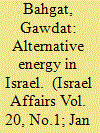

|
|
|
|
|
| Publication |
2014.
|
| Summary/Abstract |
Unlike other countries in the Middle East, Israel has limited hydrocarbon deposits. Since its founding in 1948 Israel has largely relied on foreign supplies to meet almost all its energy needs. In recent years substantial natural gas deposits have been discovered in the Eastern Mediterranean. These discoveries are likely to fundamentally improve the country's energy security. Equally important, Israel has invested massive efforts and resources to utilize the largely untapped solar and wind power. It has also considered initiating a nuclear power programme. Finally, efforts have been made to raise energy efficiency.
|
|
|
|
|
|
|
|
|
|
|
|
|
|
|
|
| 2 |
ID:
127941


|
|
|
|
|
| Publication |
2014.
|
| Summary/Abstract |
This article examines Turkey's relations with Israel and the US, based on both IR theory and foreign policy analysis. It argues that by way of enhancing its regional and international status, Turkey has chosen to undermine its ties with Israel in an attempt to 'bandwagon for profit' so as to maximize its power and promote a revisionist strategic agenda. This behaviour, however, has produced 'the Brutus Syndrome' whereby the closest ally of the powerful actor eventually turns against it in order to achieve a first step towards the realization of its major revisionist schemes.
|
|
|
|
|
|
|
|
|
|
|
|
|
|
|
|
| 3 |
ID:
127940


|
|
|
|
|
| Publication |
2014.
|
| Summary/Abstract |
The history of the Bank of Israel is often told as a story that leads from servitude to independence. According to this conception, the bank was a weak and marginal institution during the developmental period of the state, and it turned into an independent actor in the neoliberal period. This article argues that the portrayal of the bank as marginal during the developing period fails to recognize the essential role it played in contributing to the capacity of the state to allocate credit more effectively. It maintains that that Bank of Israel provided the state with market compatible instruments in order to govern the banking system and depoliticized the allocation of credit. The establishment of the bank had two effects on Israel's political economy: it enabled the government to weaken its dependence on the Histadrut as an agent of development and it allowed it to nurture linkages with the private sector.
|
|
|
|
|
|
|
|
|
|
|
|
|
|
|
|
| 4 |
ID:
127938
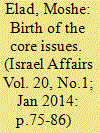

|
|
|
|
|
| Publication |
2014.
|
| Summary/Abstract |
In the last two decades, the Israeli-Palestinian conflict has been highly identified with the dispute over the core issues: Israel's annexation of East Jerusalem, the establishment of settlements in the disputed territories, the final borders between the two parties and the Palestinian refugee problem. The first three issues were a result of the 1967 war, while the refugee problem was a corollary of the 1948 war. However, it was the Israeli administration from 1967 to 1976 that exposed refugee camps to the Israeli public and made some initial efforts to resolve the problem.
|
|
|
|
|
|
|
|
|
|
|
|
|
|
|
|
| 5 |
ID:
127936
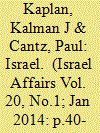

|
|
|
|
|
| Publication |
2014.
|
| Summary/Abstract |
Political attitudes towards the modern state of Israel are substantially influenced by underlying theological issues in Pauline Christianity regarding ethnic versus spiritual Israel. The very charge of Israel as occupier can be seen as an inverted perception or even a psychological projection emerging from the supersessionist view that the Pauline Church is the New Israel, displacing the Jewish people as God's elect. Hard and soft political charges of Israel as 'occupier' are discussed as are hard and soft claims of theological supersessionism. Dual covenant Christians tend not to espouse the view of Israel as occupier. Finally, these political and theological realms of thinking are linked in an attempt to bring psychological clarity to the peculiar nature of political projection towards the modern state of Israel, among Christians and even post-Christians in the West.
|
|
|
|
|
|
|
|
|
|
|
|
|
|
|
|
| 6 |
ID:
127937
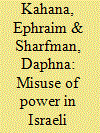

|
|
|
|
|
| Publication |
2014.
|
| Summary/Abstract |
One of the relatively minor security organizations in the Israeli Ministry of Defence, the MALMAB - tasked with protecting Israel's well-known policy of nuclear ambiguity - has gone beyond the usual criminal process established by the rule of law to the grey area of interrogating and even harassing people who seemed to not abide by its strict policies, thus highlighting the tension between legal rules and non-legal sanctions exercised in the name of national security. This article analyses three different cases connected to the issue of nuclear ambiguity, while aiming to debate the sensitive issue, prominent in every democracy, of the limits and balance of security versus democracy.
|
|
|
|
|
|
|
|
|
|
|
|
|
|
|
|
| 7 |
ID:
127939


|
|
|
|
|
| Publication |
2014.
|
| Summary/Abstract |
Israeli Prime Minister Ariel Sharon's unilateral disengagement from the Gaza Strip was a pivotal event not only in the development of the Israeli-Palestinian conflict, but also in Israel's domestic political discourse. Yet the act of withdrawal, which is seen by some in Israel as a misguided attempt to advance peace, or at least separation, is interpreted very differently abroad. This article evaluates the various narratives that emerged about the motives for disengagement, seeking to understand why diverging narratives arose. It also addresses broader theoretical questions about the use of unilateralism, particularly in the context of conflict resolution.
|
|
|
|
|
|
|
|
|
|
|
|
|
|
|
|
| 8 |
ID:
127935
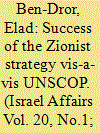

|
|
|
|
|
| Publication |
2014.
|
| Summary/Abstract |
The article examines the successful political strategies employed by Zionist diplomacy in the summer of 1947 vis-à-vis UNSCOP (the United Nations Special Committee on Palestine). The committee's recommendation of partition and the creation of a Jewish state on the majority of the territory between the Mediterranean and the Jordan River served as the basis for the UN partition resolution of 29 November 1947.The Zionist leaders made UNSCOP aware of their willingness to accept partition, but conditioned this on enlarging the territory of the future state. In this regard, the climax of their campaign, recounted in the article, was a secret and informal meeting between the senior echelons of the Jewish Agency and most members of UNSCOP on 14 July, an event that has been missed by historical research. The article describes the crucial influence of the Zionist message when UNSCOP came to formulate its conclusions and contributes to a better understanding of the process that led UNSCOP to its final recommendations.
|
|
|
|
|
|
|
|
|
|
|
|
|
|
|
|